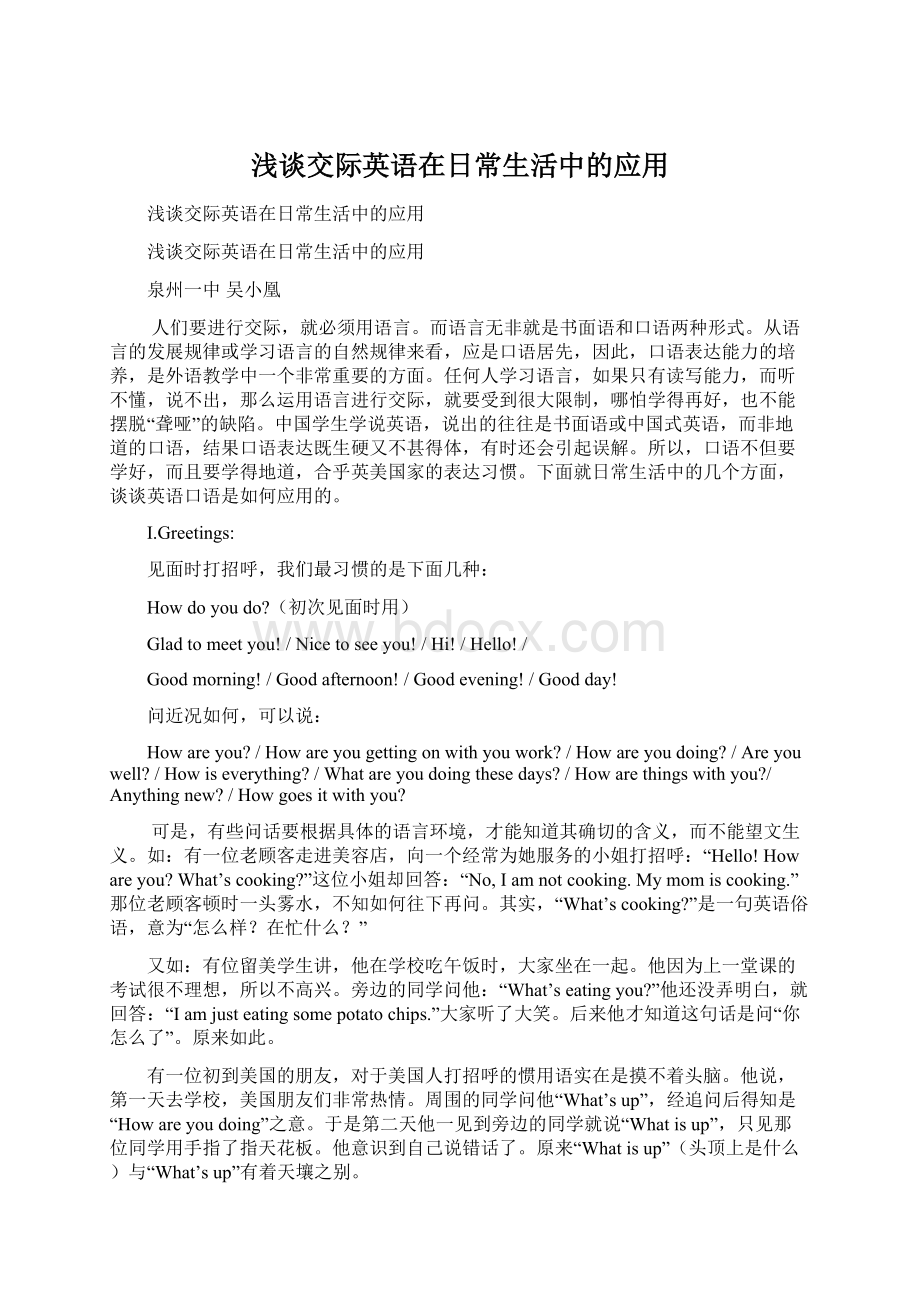浅谈交际英语在日常生活中的应用.docx
《浅谈交际英语在日常生活中的应用.docx》由会员分享,可在线阅读,更多相关《浅谈交际英语在日常生活中的应用.docx(8页珍藏版)》请在冰豆网上搜索。

浅谈交际英语在日常生活中的应用
浅谈交际英语在日常生活中的应用
浅谈交际英语在日常生活中的应用
泉州一中吴小凰
人们要进行交际,就必须用语言。
而语言无非就是书面语和口语两种形式。
从语言的发展规律或学习语言的自然规律来看,应是口语居先,因此,口语表达能力的培养,是外语教学中一个非常重要的方面。
任何人学习语言,如果只有读写能力,而听不懂,说不出,那么运用语言进行交际,就要受到很大限制,哪怕学得再好,也不能摆脱“聋哑”的缺陷。
中国学生学说英语,说出的往往是书面语或中国式英语,而非地道的口语,结果口语表达既生硬又不甚得体,有时还会引起误解。
所以,口语不但要学好,而且要学得地道,合乎英美国家的表达习惯。
下面就日常生活中的几个方面,谈谈英语口语是如何应用的。
I.Greetings:
见面时打招呼,我们最习惯的是下面几种:
Howdoyoudo?
(初次见面时用)
Gladtomeetyou!
/Nicetoseeyou!
/Hi!
/Hello!
/
Goodmorning!
/Goodafternoon!
/Goodevening!
/Goodday!
问近况如何,可以说:
Howareyou?
/Howareyougettingonwithyouwork?
/Howareyoudoing?
/Areyouwell?
/Howiseverything?
/Whatareyoudoingthesedays?
/Howarethingswithyou?
/Anythingnew?
/Howgoesitwithyou?
可是,有些问话要根据具体的语言环境,才能知道其确切的含义,而不能望文生义。
如:
有一位老顾客走进美容店,向一个经常为她服务的小姐打招呼:
“Hello!
Howareyou?
What’scooking?
”这位小姐却回答:
“No,Iamnotcooking.Mymomiscooking.”那位老顾客顿时一头雾水,不知如何往下再问。
其实,“What’scooking?
”是一句英语俗语,意为“怎么样?
在忙什么?
”
又如:
有位留美学生讲,他在学校吃午饭时,大家坐在一起。
他因为上一堂课的考试很不理想,所以不高兴。
旁边的同学问他:
“What’seatingyou?
”他还没弄明白,就回答:
“Iamjusteatingsomepotatochips.”大家听了大笑。
后来他才知道这句话是问“你怎么了”。
原来如此。
有一位初到美国的朋友,对于美国人打招呼的惯用语实在是摸不着头脑。
他说,第一天去学校,美国朋友们非常热情。
周围的同学问他“What’sup”,经追问后得知是“Howareyoudoing”之意。
于是第二天他一见到旁边的同学就说“Whatisup”,只见那位同学用手指了指天花板。
他意识到自己说错话了。
原来“Whatisup”(头顶上是什么)与“What’sup”有着天壤之别。
II.Findingtheway:
问路,通常可以有下面几种:
Canyoutellmewherethebusstopis?
/CanyoutellmehowIcangettothebusstop?
/
Excuseme.Whichisthewaytothebusstop?
/Excuseme.Whereisthenearestbusstop?
Couldyoutellmethewaytothebusstop?
/Isthereabusstopnearhere?
/
AmIontherightroadtothebusstop?
/Canyoudirectmetothebusstop?
/
Excuseme.Isthebusstopstraighton?
I’mafraidyou’regoingintheoppositedirection./
I’mgoingtheremyself.Letmeleadyoutheway./It’sabouttenminutes’walk./
It’sjustroundthecorner./It’sonlytwoblocksaway./It’snexttotheNationalBank./
It’stoofartowalk.You’dbettertakeataxi.
III.Shopping:
售货员招呼顾客通常用以下表达法:
CanIhelpyou?
/AnythingIcandoforyou?
/WhatcanIdoforyou?
/
WhatcanIshowyou?
/Areyoubeingserved?
/Areyoubeingseento?
顾客要告诉店员想买点什么,可以这么说:
Doyouhaveanycoatthatwillfitme?
/Ineedapairofshoes,size26,please./
Canyoushowmeaskirt?
/I’dliketobuyaready-madesuit.
如果想要的物品型号、颜色、款式不对,可以这么说:
Bringmealargersize,please./Ipreferadifferentcolor./Iwantsomethinginlightcolor.
IsupposeI’dlikesomethingmadeinChina./Iwantapairoftrouserswithoutturn-ups./
I’dlikesomethingplainandquiet./Pleaseshowmetheblueonemysize./
Showmethisone,please./Idon’tthinkthecushionmatchesthesofa./
It’sabitsmallonme./Ithinktheskirtisashadedarker./It’stoosmallallover.
如果顾客要询问物品的价格,可以这么问:
Aretheseapplesonsale?
(这些苹果降价吗?
)/
Howdoyousellthewatermelons?
(这些西瓜怎么卖?
)/
Howmuchdoyouaskforit?
/Howmuchdoyousellit?
/Howmuchdoesitcost?
/
Howmuchisthatworth?
/Howmuchisitaltogether?
/Howmuch,please?
/
HowmuchshallIpayforit?
/What’sitworth?
/Whatdoesitcost?
/
What’sthepriceoftheapples?
/Whatdoesitcometo?
/Whatdoesitsellfor?
/
Isthisthesaleprice?
(这是减价以后的价格吗?
)
如果顾客想讨价还价,可以这么说:
Ithinkit’stooexpensive./Canyoucomedownabit?
/It’sdaylightrobbery!
(太贵了!
)
Icangiveyounomorethan$20.Canyousellitforme?
/
That’sabitmorethanIwantedtopay./Thatsoundsreasonable./
Idon'tthinkIcouldaffordtospendsomuchmoneyforthisjewel./
Thepriceisnotreasonable./Thisisnice,butIsupposeit’squiteexpensive.
如果卖方要讨价还价,他会这么说:
Howmuchwouldyoulikeittobe?
(你想出多少钱?
)
It’sarealbargain.(这是真正的便宜货。
)
It’sourstandardprice.(这是我们的标准价格。
)
Onehundreddollars,youcan’tbewrongonthat.(一百美元,这个价钱您不会吃亏的。
)
Ourpricesarenotdearerthanthoseinotherplaces.(我们的价格不比别的地方贵。
)
That’safiresale.(这是便宜货。
)
That’sthebestwecando.(我们不能再让了。
)
Yougetachancelikethisonlyonceinabluemoon.(这可是千载难逢的机会呢。
)
Wedon’taskfortwoprices.(我们不讨两种价格。
)
Thepriceisreasonablebecausethequalityissuper.(这价格是合理的,因为质量极好。
)
Wedon’tgivediscounts.(我们不打折扣。
)
That’sourrockbottomprice.(这是我们的最低价了。
)
That’salmostcostprice.(这几乎是成本价了。
)
IV.Goingtoseeadoctor:
在看病时,医生通常先询问病人的病情:
What’swrongwithyou?
/What’sthetrouble?
/How’syoursleep?
/
What’swrongwithyourear?
/What’syourappetitelike?
/Howlonghaveyoubeenlikethis?
/Howbadisit?
/Howareyoufeelingnow?
/Doyoucough?
/Doyoufeeltired?
/
What’sthematterwithyou?
病人要诉说病情,可以如下表示:
Icoughagreatdealatnight./Aboutaweeknow./Ifeelapaininmyleftleg./
Ifeelfeverish./Ifeelhotandcold./IfeeldizzyandI’vegotnoappetite./Ifeelsick./
Ihaveastomachache./Ifeeladullpaininthestomach./I’vebeenlosingsleep./
Ithurtsterrible./Ikeepfeelingdizzy./Myeyeshavebeensore.
医生对病人进行诊断与治疗,他可能会说: